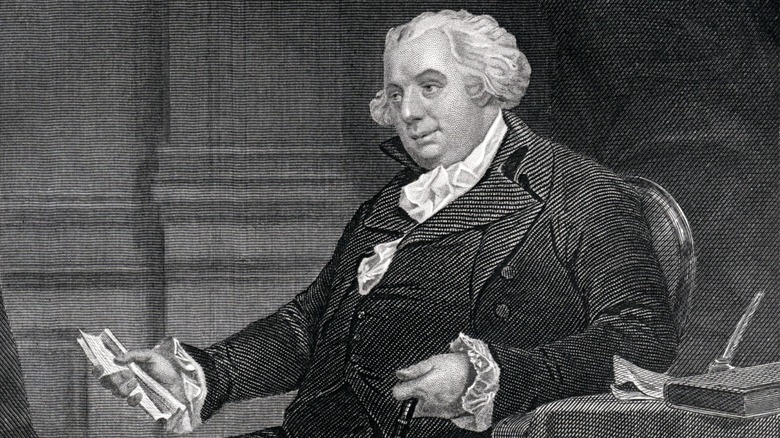How A Whale Bone Used In A Medical Procedure Killed A Founding Father
The early days of American history were filled with conflict, chaos, and war. However, out of this initial turmoil rose the men who would eventually be dubbed the Founding Fathers of the United States. Events like the Continental Congresses and the Constitutional Convention gave us prominent American figures like George Washington, Thomas Jefferson, and John Adams. While those are the names we generally see in history books, there are also plenty of people whose names we don't often hear, even though they were a part of those significant moments in American history.
Unless you are a true scholar of American history, it's likely that you have never heard of a man named Gouverneur Morris. He was in attendance at the Constitutional Convention in 1787 and took a position helping the newly formed government manage its finances (per Mental Floss). Though Morris had a robust political career, he was reportedly a bit of a character. Arguably the most bizarre thing about his life was how he died.
He Was A Diplomat, Statesman and Financial Expert
Gouverneur Morris was born January 31, 1752 in Morrisania Manor House, New York (per Britannica). He was born to a wealthy family and would go on to attend what is now Columbia University. While there, he studied law. Ironically enough, initially, Morris didn't want the colonies to break from England, but he later changed his mind and joined the cause. He would go on to serve on the New York Provincial Congress, sign the Articles of Confederation, and even serve as a lieutenant colonel in the New York state militia.
After participating in the Continental Congress of 1778, Morris was not reelected to Congress the following year. He then became the assistant to the superintendent of finance, and while there, he helped create the decimal coinage system. This system would become the foundation of the monetary system still used today in the United States.
Though Morris had an accomplished career, his personal life was a bit uncommon compared to other government officials at the time. Physically, Morris differed from his fellow congressmen due to the fact that he had a wooden leg as a result of amputation following an accident in 1780 (per History). In addition to his leg, he was also known as a bit of a ladies' man who reportedly preferred married women. He even allegedly had an affair in the Louvre with the wife of a French count. Morris eventually married his housekeeper, who allegedly murdered her newborn child years earlier.
An Unconventional Life Comes to an Unusual End
While he led a rather interesting life outside his political aspirations, it isn't surprising that his death was also a little different. According to Mental Floss, by the time he was in his 60s, Morris' health was beginning to really deteriorate. He suffered from gout, which was starting to shut his body down. In his search for relief, Morris tried every possible remedy under the sun, including bloodletting, enemas, and endless herbal concoctions. Though gout was a major problem, his biggest issue became his inability to urinate.
Morris likely had a blockage of some kind, which could have been something as common as a urinary tract infection. However, Morris decided to attempt to get relief in a rather brutal fashion. He tried to clear the possible blockage by placing a sliver of whalebone up his urethra to act as a catheter of sorts. While Morris successfully used a similar version of this method before using hickory, this time was anything but. This attempt to cure himself resulted in damaged tissue that became infected. It was that infection that would result in Gouverneur Morris' death on November 6, 1816.


